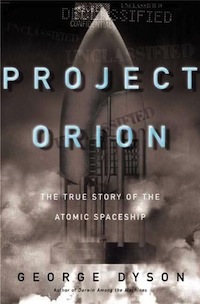Project Orion : The True Story of the Atomic Spaceship by George Dyson ISBN: 0-8050-5985-7
 The year was 1957, the cold war was cold, the space race was hot, and atmospheric nuclear testing was just dandy. It was a time ripe for all sorts of crazy ideas and the perfect environment for Project Orion, a serious proposal to send an ocean liner sized space craft touring around the solar system propelled by nuclear bombs.
The year was 1957, the cold war was cold, the space race was hot, and atmospheric nuclear testing was just dandy. It was a time ripe for all sorts of crazy ideas and the perfect environment for Project Orion, a serious proposal to send an ocean liner sized space craft touring around the solar system propelled by nuclear bombs.
The idea is simple. The rear of the ship consists of a huge plate connected to the rest via a system of shock-absorbers. Every second or so you chuck a nuclear bomb surrounded by some mass out the back. It explodes on the other side of the plate (about 100 feet behind the back of the craft), the blast is carefully shaped to aim the resulting plasma back towards the ship. Large amounts of force are transferred to the plate this way, which pushes against the shock-absorbers and accelerates the craft at a huge but manageable rate. Monstrous craft could be conceivably lifted from the ground into orbit on a column of radioactive explosions.
What could possibly go wrong?
Project Orion is a distillation of what must have been an exhausting period of research. Dyson (son of Freeman Dyson) has talked to most of the original scientists and engineers who worked on the project, and organised so much declassified information that NASA eventually paid for him to ship a copies back to them. The book goes into fascinating detail on the (considerable) engineering problems the Orion idea, which lots of interesting diagrams with the word "Classified" crossed out. Much of the engineering is still classified since things like the size and make-up of the propellent bombs are still military secrets.
But what really killed the project was the political will that eventually put a man on the moon was never behind Orion. The (brand-new) NASA didn't want nuclear bombs, and the Air Force didn't really need a manned craft. There was never a real test of the basic concept (although small model flights with chemical explosives were tried) and everybody went on to other things. Probably for the best really, although the surviving staff members interviewed for this book seem divided as to whether it was feasible and worth doing, feasible but morally wrong, or just an unworkable idea.
As a book Project Orion is well written and certainly well researched, if a little dry for easy reading. I found the engineering aspects a lot more interesting than the political side, some of the ideas were sheer lunacy but I guess that when you accept the plan of exploding nuclear bombs just behind you further madness begins to sound plausible.
Recommended, but only if you like this sort of thing.